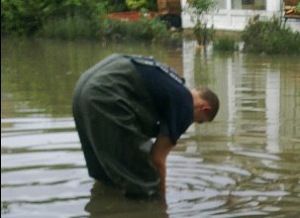News
Copenhagen further protecting itself from flooding
This article is more than 8 years old.
Capital calls for more governmental help and perhaps a change in legislation

Stepping up efforts (photo: Stormrådet)
In the wake of the flooding that affected the nation this week, Copenhagen has announced it will unveil a new strategy in the future aimed at preventing flooding in the capital.
Morten Kabell, the deputy mayor for technical and environmental issues, contended that the recent flooding in Denmark underlined the importance of stepping up flood-prevention efforts.
“Last year, when a new evaluation revealed that Copenhagen was more threatened than previously anticipated, the city decided to boost its work protecting the city against floods,” said Kabell.
“The worst-case scenario is that we can endure flood damage to the tune of 19 billion kroner. So we need to get working on establishing protection against flooding as soon as possible.”
READ MORE: Flooding in Denmark becoming the norm
Calling for governmental help
However, the plan, which will be completed sometime later this year, may require a change in legislation to allow the government to take greater responsibility for coastal protection.
Kabell called on the food and environment minister, Esben Lunde Larsen, to step up and take more responsibility.
“The law needs to be changed so we have clearer rules regarding the financing of flood protection,” said Kabell.
“In several areas of the country it could be necessary for the state to contribute financially. Furthermore, it could be that the state must take more responsibility for evaluating where coastal protection is required and co-ordinate across municipal borders to ensure smooth co-operation between municipalities.”
As the law stands today, it is the affected property owners who must finance the coastal protection, although municipalities can contribute financially.
READ MORE: Copenhagen wins international award for flood prevention
Few damage reports
In related news, Stormrådet, the Danish storm council, expected fewer insurance claims for damage following the floods this week, compared to the extensive damage suffered during the 2006 floods.
“People are getting better at taking care of their houses, and the emergency agency is much better at fighting flooding with its new water tubes,” Mogens Hansen, the head of Stormrådet, told DR Nyheder.
The two big insurance companies Tryg and Codan also said they had received “surprisingly few” damage reports so far.










































